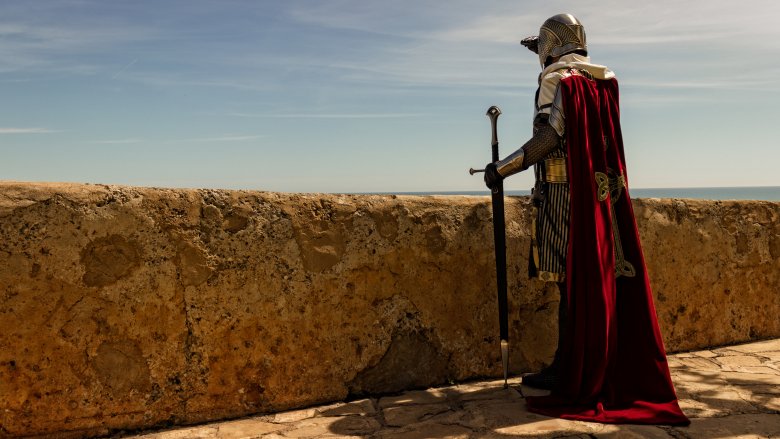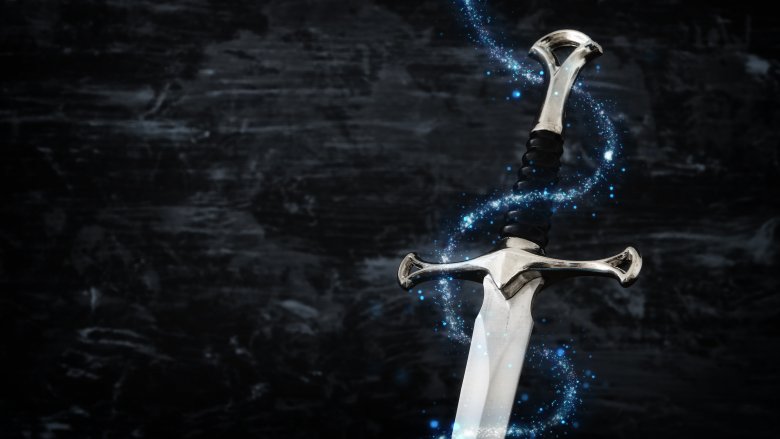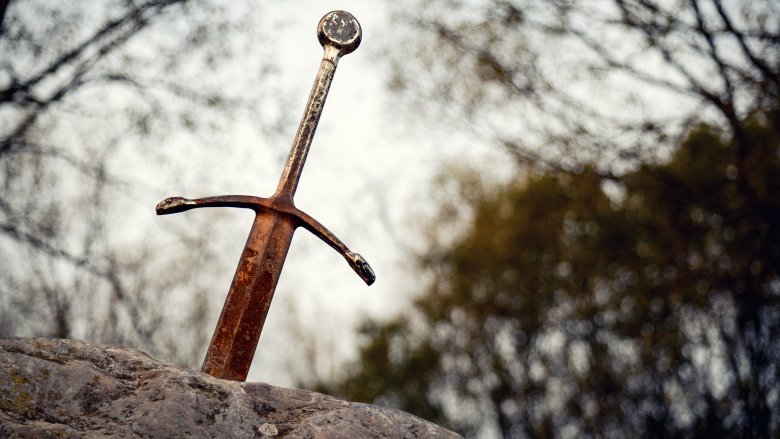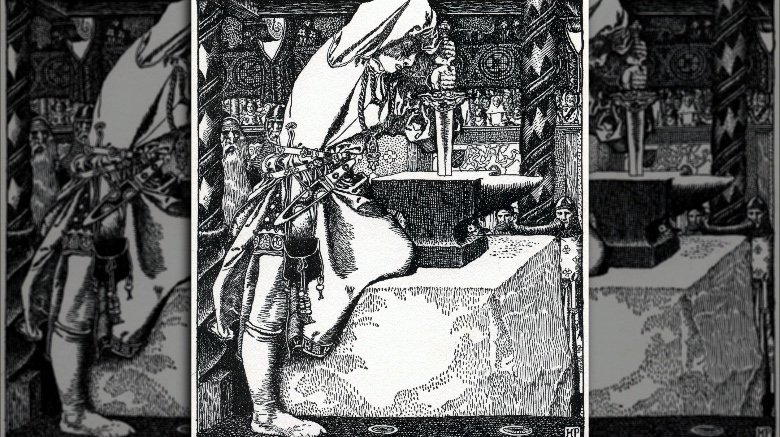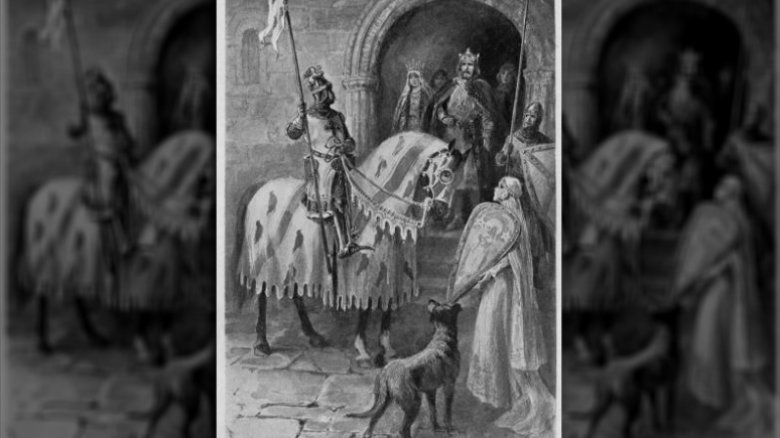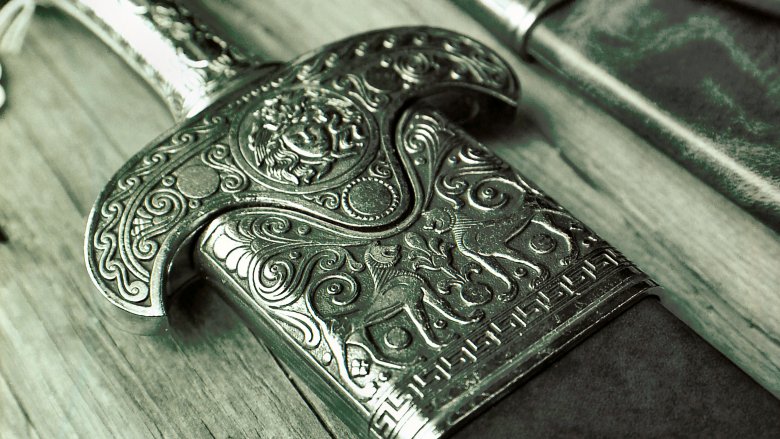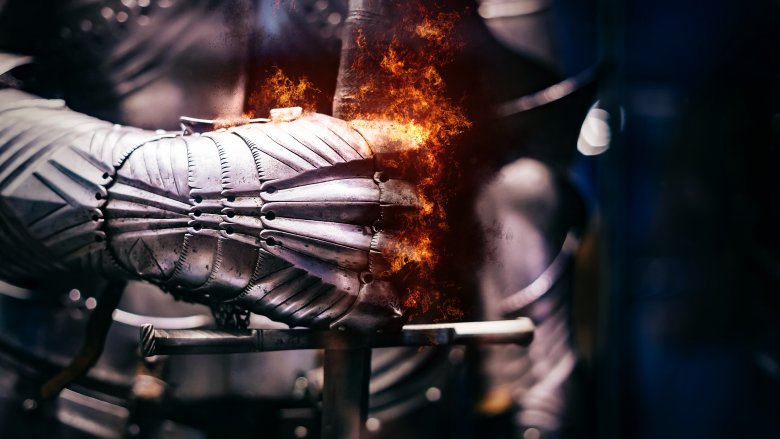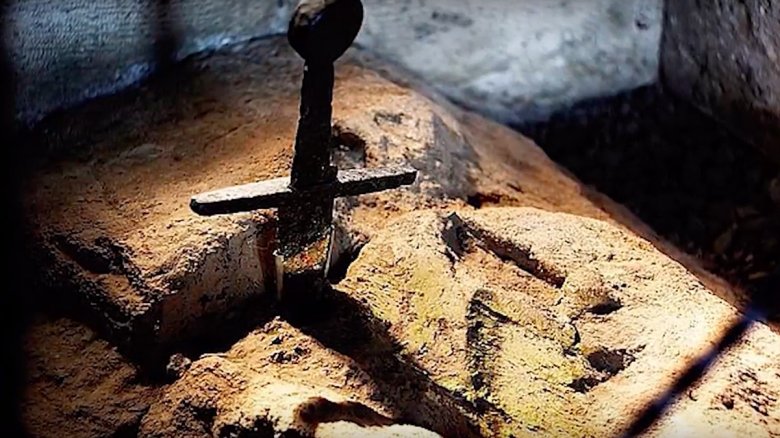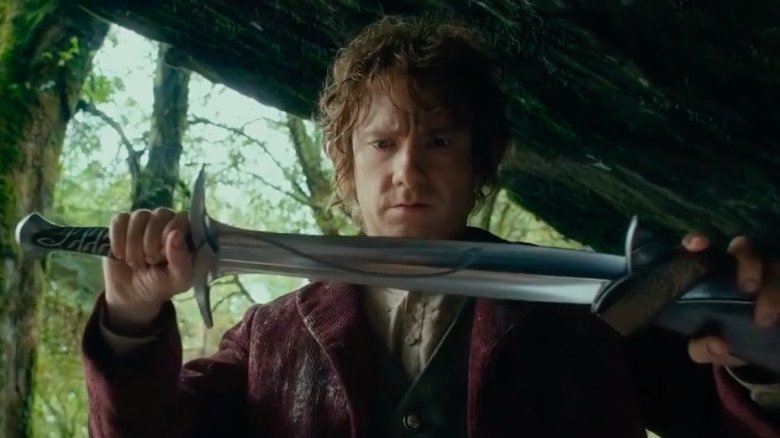The Untold Truth Of Excalibur
Unless you've been living under a stone (but probably not one with a sword in it), you've heard of King Arthur and his legendary blade Excalibur. How could you help it, really. First there's the actual legend of King Arthur, and then there's the Disney version, then there's the one with Whoopi Goldberg, and that other one where everyone sings, and Shrek the Third, and the one where Arthur is a Roman centurion, and the one where MacGyver travels back in time and ends up in Camelot, and the one where everyone is running around banging coconuts together because they couldn't afford to hire real horses (that's the best one, by the way). Anyway, our culture has been totally oversaturated with images of the noble king, his Knights of the Round Table, that dude with the long white beard, and Excalibur, so much so that we'd probably barely recognize the original story.
And because we can all use just a little more saturation, here are some of those forgotten details about King Arthur and his famous sword, the ones that don't typically show up in the reimagined versions we are all so very, very sick of seeing on the big and small screens.
Excalibur is just one in a long line of legendary "swords of power"
None of the reinventions of the King Arthur legend are especially original, mostly because they're all based on the same legend from like a thousand years ago. But even the original story wasn't really very original, because the idea of a "sword of power" has been around for a long time, long before anyone ever imagined a noble king, a magic sword, and a wizard.
According to the Ancient History Encyclopedia, Excalibur is really just a copyright violation of the Sword of Mars, the supernatural sword wielded by Attila the Hun, which was really just a copyright violation of Julius Caesar's Crocea Mors, which was really just a copyright violation of the harpe, the legendary sword used by the titan Cronos in Greek mythology. Even the Bible featured a sword of power — after the fall of man, God had his cherubim stand at the gate of the Garden of Eden with a flaming sword, presumably to deter Adam and Eve from sneaking back into paradise. There was also the magical sword the Shinto god Susanoo found in the tail of a dragon, and the sword that belonged to Sigmund and his son Sigurd in Norse mythology. Shall we go on? Swords of power are not an original concept. So all those various Hollywood versions of Excalibur were really just recyclings of an old legend, which was really just a recycling of some other very, very old legends.
It wasn't always called "Excalibur"
Today, most of us wouldn't imagine calling Excalibur by any other name, because no matter which stupid version of the Arthurian legend we're watching, Excalibur is always Excalibur. But would you believe that the early versions of the story called Excalibur by other names?
In the earliest mentions of Arthur, no one really brings up the sword, and when they finally do, they don't call it "Excalibur." According to the Ancient History Encyclopedia, an early 12th century work (or possibly 13th century, depending on who you ask) called "Culhwch and Olwen" from a Welsh collection of legends called the Mabinogion was the first to call Arthur's sword by a name. In that story, it was called "Caledvwich," from the Latin chalybs, meaning "steel" or "iron." Not super creative, but descriptive.
Geoffrey of Monmouth's 1136 work History of the Kings of Britain calls the sword "Caliburnus," which describes an especially hard, steel blade, and is therefore a somewhat upgraded name. A French translation later changed "Caliburnus" to "Chaliburn," and a French poet named Chretien de Troyes inexplicably changed the name to "Escalibor." When the story was finally translated into English, Chaliburn and Escalibor were combined to form "Excalibur." Happily, no one else ever mucked with the name after that, because it's nice to have at least one thing about the King Arthur legend be more or less consistent.
Excalibur didn't used to have magic powers
The earliest known mention of King Arthur was the Welsh poem Y Gododdin, which may date to around 600 AD. Y Gododdin really only mentions Arthur in passing, though, and there's no mention of Excalibur — it wasn't until the 12th century that Geoffrey of Monmouth made Arthur a star in his History of the Kings of Britain. But in that story, Excalibur (called Caliburnus) had no magical powers and was described simply as "the best of swords, that was forged within the isle of Avallon."
According to the Ancient History Encyclopedia, Arthur does go on to perform almost supernatural feats with the help of Caliburnus, but the reader is made to feel like the sword is just a tool for his triumph rather than the whole reason for it. "Whomesoever he touched, calling upon God, he slew at a single blow, nor did he once slacken in this onslaught until that he had slain four hundred and seventy men single-handed with his sword Caliburn." So yeah, that makes Arthur sound pretty badass, but it doesn't really say much about Caliburn. The sword is just a sword with a not-very-inspired name, which helped Arthur (and God, evidently) take down a buttload of people.
Excalibur eventually became more than just a sword
Very old stories tend to evolve through time, probably so people won't get bored of hearing them. Leaving aside the part where the King Arthur story has evolved through time so much that Whoopi Goldberg and MacGyver somehow got involved, less-recent versions of the old story were altered until Arthur no longer seemed like just some badass dude with a cool sword, but a badass dude who was so badass he maybe had magical powers. After that, it wasn't a huge leap to get to Merlin, the Lady of the Lake, and the White Rabbit of Caerbannog.
Later stories about Arthur and Excalibur elevated the importance of the sword. As the tale was retold and retold again, Excalibur became more than just a weapon. It wasn't just forged within the isle of Avallon, it was forged by an elf on the isle of Avallon. Its otherworldly origins make it an important character in the story of King Arthur, rather than just a prop. When Arthur lies dying, he implores Sir Bedevere (or sometimes Sir Girflet, depending on the version) to throw Excalibur back into the lake. According to the Ancient History Encyclopedia, that's a device used in other stories of magical weapons, too — when it is done serving its master, the weapon must be returned to the magical realm it came from.
The Sword in the Stone was not Excalibur
We all know how Arthur becomes king — he's the only guy who can pull a sword out of a rock and that somehow qualifies him to rule an entire kingdom. That usually doesn't happen in modern America, except for that one time when California decided to make Arnold Schwarzenegger the governor.
In early legends, though, Excalibur and the Sword in the Stone were not the same weapon. Because would you really want to carry into battle some blunt old sword that was sticking out of a rock for decades getting rained on and probably peed on by wolves and bears and drunken knights who are annoyed they can't pull the stupid thing out of the rock? Didn't think so. The Sword in the Stone really doesn't seem like it would be an especially great weapon, which is probably why Arthur was given a second sword by the Lady of the Lake.
According to Ancient Origins, the two swords were first confused in Sir Thomas Malory's 1485 Le Morte d'Arthur. But in most of the stories, the Sword in the Stone and Excalibur are two different weapons — in fact in Malory's story, Arthur has two swords, both called "Excalibur." The first Excalibur (the one he pulled from the stone) breaks during a fight with King Pellinore. (See? All that rain and pee.) Shortly after that, Merlin takes Arthur to see the Lady of the Lake, and that's where he obtains Excalibur number two.
So where did the Sword in the Stone idea come from?
Excalibur predates the Sword in the Stone, which first appeared in a 13th-century romance by the French poet Robert de Boron. In that story, the sword was drawn out of an anvil rather than a rock. Later storytellers evidently didn't want you confusing King Arthur with the Road Runner, so the anvil was changed to a stone.
According to Ancient Texts, in Robert de Boron's story, the sword is stuck in an anvil in a churchyard, and naturally, all the knights of the realm want to be the guy who pulls the sword out of the anvil, because for some reason it never occurs to anyone that being a king sucks on account of the fact that people are always trying to kill the king.
No one succeeds except Arthur, and he succeeds accidentally because he has no idea what the sword actually represents. He's just looking for a sword to give to his foster brother Kay, and the sword in the anvil happens to be handy. So Arthur pulls the sword out of the anvil and gives it to Kay, and Kay is all, "Hey look at me I pulled the sword out," because in old stories everyone but the hero is basically a jerk. Anyway, Kay is found out, Arthur repeats the feat, and then he becomes king. And eventually, someone kills him. See? Leave swords in anvils alone, people. You don't want any of that crap.
In some stories, Excalibur is wielded by Sir Gawain
Even in the 12th century, people must have been sick of all these different versions of the King Arthur story, so writers were forever trying to differentiate their stories from the old, tired versions, and it's not like they had Whoopi Goldberg or MacGyver to help them out with that. According to the Vintage News, in 1160, a poet named Chretien de Troyes wrote a version of the tale called Conte du Graal, in which Excalibur was wielded by Arthur's nephew and most trusted knight, Sir Gawain.
Even so, it's not like Arthur said, "Here, take this sword I'm done with it." In the Vulgate Cycle, another Arthurian story published a half-century or so after Conte du Graal was written, Arthur loans Excalibur to Gawain, and then Gawain loans it to Lancelot so Lancelot can use it to defend Guinevere. Eventually, the sword is returned to Arthur, who uses it during his final battle with Mordred.
It's not the sword, it's the scabbard
In Sir Thomas Malory's version of the story, Excalibur might be special, but it's not the real reason why Arthur is such a badass. In fact according to the Ancient History Encyclopedia, in Malory's tale, Merlin scold's Arthur for preferring the sword over the scabbard. "Ye are the more unwise," he says, "for the scabbard is worth ten of the sword. While ye have the scabbard upon you, ye shall never lose any blood, be ye ever so sorely wounded. Therefore always keep the scabbard with you." Yes, Merlin is saying that the scabbard is basically a Star Trek shield, so buckle that thing to your waist like a freakin' chastity belt, dude.
But alas, Arthur loses both Excalibur and the scabbard toward the end of the story, when his half-sister Morgan le Fay steals the scabbard and swaps out Excalibur for a fake, thus tipping the victory scales in favor of her boyfriend, who goes on to do battle with the king. When Arthur's sword breaks, that's a tipoff that it's a fake, but he manages to defeat Morgan's beau anyway and in an act of revenge, she throws the scabbard into a lake. Arthur survives the fight, but he's later killed by Mordred, largely because he no longer has the scabbard to protect him. What did we tell you about buckling that thing on, Arthur? Some noble kings with magical weapons never learn.
The sword was pretty magical too, though
By the time the later stories were written, Excalibur wasn't just a weapon, it was a legend. In Thomas Malory's story, the sword helps Arthur win a battle with King Lot, not because Arthur is awesome with a sword but because the sword is awesome all by itself. In fact, Arthur is getting soundly thumped by Lot until he decides to use Excalibur's special powers to win the fight. "Therewith King Lot smote down King Arthur," Malory wrote. "With that, his four knights rescued him and set him on horseback; then he drew his sword Excalibur, and it was so bright in his enemies' eyes that it gave light like thirty torches. Therewith he put them back and slew many people." Hmm, okay so why didn't you do that before King Lot smote you?
According to Hanover College, Excalibur had other powers, too, besides just being the brightest LED flashlight in history. It was supposed to be unbreakable, and it was also supposed to be especially sharp, not because Arthur or his squire spent a lot of time honing it but because it was reinforced with magic. That's why when Arthur told Sir Bedivere on his deathbed that he needed to throw Excalibur back into the lake, Bedivere was all, "What? I'm not throwing a perfectly good sword into a lake." Sorry Arthur, but it does seem a bit on the selfish side. It's not like you're going need it anymore.
The girl who found Excalibur ... sort of
There may have been some historical basis for the King Arthur character, but most historians agree that he's 99.9 percent fiction, which means Excalibur is 100 percent fiction. According to the Vintage News, though, there's a "lake" in northeast Cornwall in the United Kingdom called Dozmary Pool, which local legend likes to claim as the home of the Lady in the Lake and therefore the final resting place of Excalibur. It's really not much to look at anymore, in fact, far from being "bottomless" it's barely more than a puddle. At some times of the year the lake even goes dry.
In August of 2017, a 7-year-old girl told her dad that she'd she'd seen a sword lying at the bottom of Dozmary Pool. Her dad was like, "Sure, sure," but when he checked it out he found an actual, 4-foot-long sword in the mud. After cleaning it, he guessed it was probably just a prop or a toy and not very old, but as far as we know it's never been presented for evaluation to any official group, so maybe, like Bedevire, Dad just wants to hang on to the perfectly good sword that may or may not be Excalibur.
Incidentally, girls finding swords in lakes appears to be a thing — in 2018, a girl in Sweden found an actual Iron Age sword in a lake. Maybe the universe is trying to tell us it's time to give women some power, already.
But there is actually an actual sword in the stone
The Sword in the Stone is not Excalibur, but it's a pretty important part of the legend of Arthur and so it's worth also mentioning that it might have actually been based on a real thing.
There is an actual real sword stuck in an actual real stone, and if you're ever in Tuscany, Italy, you can see it with your own eyes in the Montesiepi chapel southwest of Siena. It looks pretty remarkably like the sword of legend — a piece of bedrock with just the hilt, wooden grip, and a short length of blade sticking out of it. According to the Vintage News, though, the Italians don't have an Arthurian explanation for how it got there. Their story says the sword was thrust into the rock by an Italian knight named Galgano Guidotti, who was renouncing war in favor of becoming a hermit. Frankly, one doesn't really sound that much better than the other, but good for you Galgano.
For a long time people thought this sword was a fake, but recent tests have dated it to the 12th century, which is around the time that Guidotti is said to have put it there. Research also identified a large cavity beneath the sword, which they think might be a grave. But they'd have to break apart the stone to know for sure, which would ruin the whole sword-in-the-stone thing, and no one wants to go that far.
Bilbo's sword "Sting" was based on Excalibur
Not everyone who borrowed from the story of King Arthur and Excalibur felt like they should just lift the whole danged legend and tweak it in a couple of places. Some writers used the story as inspiration, and if you stop to think about it you'll probably identify J.R.R. Tolkien as one of them.
Bilbo Baggins, the hero of Tolkien's tale The Hobbit, carries a sword of power not unlike the one wielded by King Arthur. Like Excalibur, "Sting" was created by elves and like Excalibur, it glows in the presence of his enemies. Bilbo later gives Sting to Frodo, to use in his own quest, much in the same way that Arthur loans his sword to Gawain in Malory's version of the story. According to Avalon Revisited: Reworkings of the Arthurian Myth, Frodo's quest is similar to Arthur's, too — the destruction of the One Ring is Frodo's own quest for the Holy Grail. Take note, novelists and screenwriters of the world. You don't have to totally rip off the Arthurian legends to use them as inspiration.


